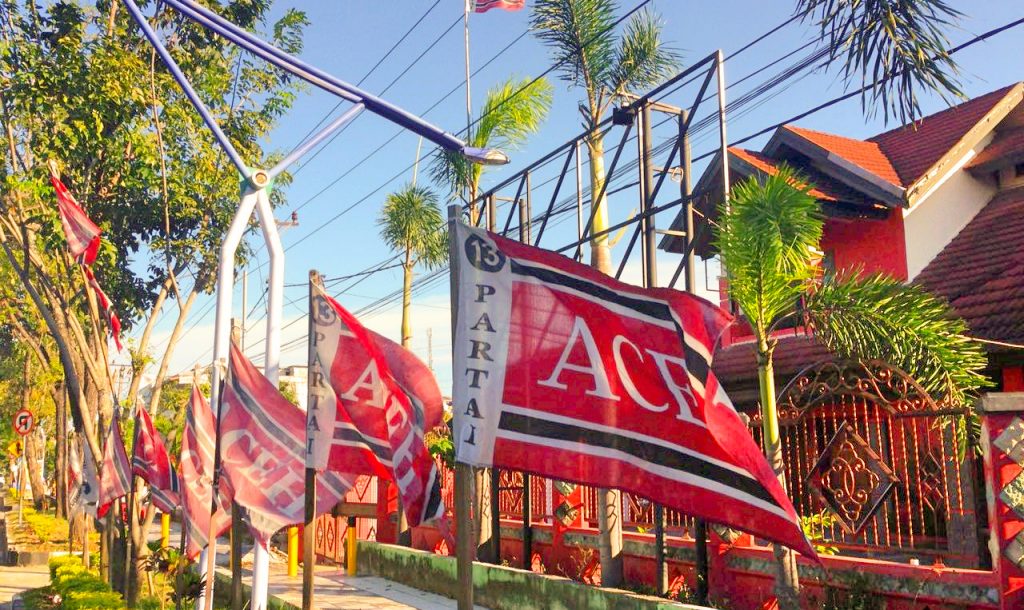The Aceh Party needs revolutionary internal change to regain the trust of the people, writes Muhammad Aris Yunandar.
The 2017 local election in the Indonesian province of Aceh has resulted in the victory of the former governor Irwandi Yusuf, an ex-propagandist of the secessionist group called Gerakan Aceh Merdeka (GAM, Free Aceh Movement). Irwandi has set aside his ex-combatant rival Muzakkir ‘Muallem’ Manaf, a former military commander of GAM and the leader of the former GAM combatants’ local party, namely the Aceh Party (PA, Partai Aceh). It is highly likely that the future of politics and security in the region will depend on how the losing party reacts and adapts to the new government, and how they prepare themselves for the upcoming 2019 legislative election.
Since its establishment, the PA has remained the strongest local political party in Aceh. Its members have been occupying most executive and legislative seats in both the provincial and district level, while its supporters have been renowned for their militancy and scattered throughout the province.
The 2012 gubernatorial election was a proof of the party’s domination with 55.8 % of votes, eliminating their big rival Irwandi Yusuf who only earned 29.2% of votes. The 2009 legislative election was also a huge victory for PA, where almost 48% of parliament seats were occupied by their members. However, the number decreased into 35% in 2014 legislative election with only 29 (out of 81 total seats) of the party members in the provincial parliament.
Obviously, Irwandi’s victory in this year’s election is both surprising and challenging for the PA, if not for the former armed conflict province. He apparently has learned much after his defeat in the past election. Harnessing the internal friction in the Aceh Party, Irwandi gained benefit from the distraction of voters in the regions where the Aceh Party has its dominant supporters.
The structure of the PA has been much more disunited than before following this year’s election. With the withdrawal of two former GAM elites from the party and their candidacy through non-party pathways, Muallem has made it easy getting the exclusive ticket from the PA. The two elites, the incumbent governor Zaini Abdullah and the former ‘minister of defence’ of GAM Zakarya ‘Apa Karya’ Saman, have decided to choose their own way in competing in the election. In fact, this year’s election was the first election where the former GAM combatants dominated the candidacy quantitatively.
The schism is nothing new among the former GAM fighters. Back in the 2006 election, far before the Aceh Party was founded, the friction had also occurred between the old leaders (mostly leaders in exile) of GAM and a group of reformists led by Irwandi Yusuf. This was the first time after the peace agreement a split occurred among the former GAM members, and was the very origin of rivalry between the PA and PNA, another local political party founded by Irwandi after he resigned from the PA.
When Irwandi and several GAM elites founded their own party in 2013, it was intended to challenge the superiority of the PA in the government. Hence, the existence of PNA is a threat to the PA. The hostility between the two groups has always been involving violence, particularly in the moments following elections. The 2012 and 2014 election, for instance, reported high numbers of electoral violence including intimidation and threats to other candidates’ supporters, vandalism, kidnapping, arson, as well as firing and killing.
Unlike before, this year’s election was performed relatively peacefully with only several minor to moderate violations such as intimidation, vandalism, as well as money politics which in other parts of Indonesia is also a common issue. However, on Sunday (5/3), just twenty days after the election day, two supporters of Irwandi has been shot in their house in East Aceh. The next day in Pidie district, an unknown perpetrator opened fire at a branch office of the winning candidate.
The incidents happened just a few days after the Independent Election Committee (KIP, Komisi Independen Pemilihan) held a press conference in Banda Aceh to announce the result of the poll. The local media reported that all other candidates’ team had accepted their loss and the victory of Irwandi, except from Muallem’s team. They walked out from the conference room and rejected the election result. Later during that day, the campaign team of Mualem also held a press conference to announce their refusal and to demand a re-vote. The spokesperson, the national politician from Partai Keadilan Sosial (PKS, The Prosperous Justice Party) Nasir Djamil, alleged that there were ‘systematic, structured, and massive’ electoral violations perpetrated by their rivals during the election day.
The latest development from the province shows that the PA is still uneasy about accepting their loss in the election. Not only has it failed to sustain its power at the provincial level, the party has also lost in the regions where their supporters are dominantly located such as in Pidie, Aceh Barat Daya and Aceh Besar. Challenges have emerged already for the legislative election in 2019 that will be faced by the Aceh Party in the nearest time.
In the interest of reclaiming power within the governmental structure, the party should contemplate and refine its position and role amidst society. Perhaps they also need to perform a revolutionary change within the party, both regarding their structure and strategies. The pomposity, corruptive culture, and also the regeneration of the party’s organisational structure are presumably the main issues that they need to resolve in order to regain the trust of Acehnese people in the near future.
Muhammad Aris Yunandar studied Political Science (Research Methods) at the University of Birmingham. He has been focusing on post-conflict politics and democratisation in Aceh, Indonesia.
Facebook: Aris Yunandar (https://www.facebook.com/aris.yunandar)
Twitter: @arisYR
 Facebook
Facebook  Twitter
Twitter  Soundcloud
Soundcloud  Youtube
Youtube  Rss
Rss 